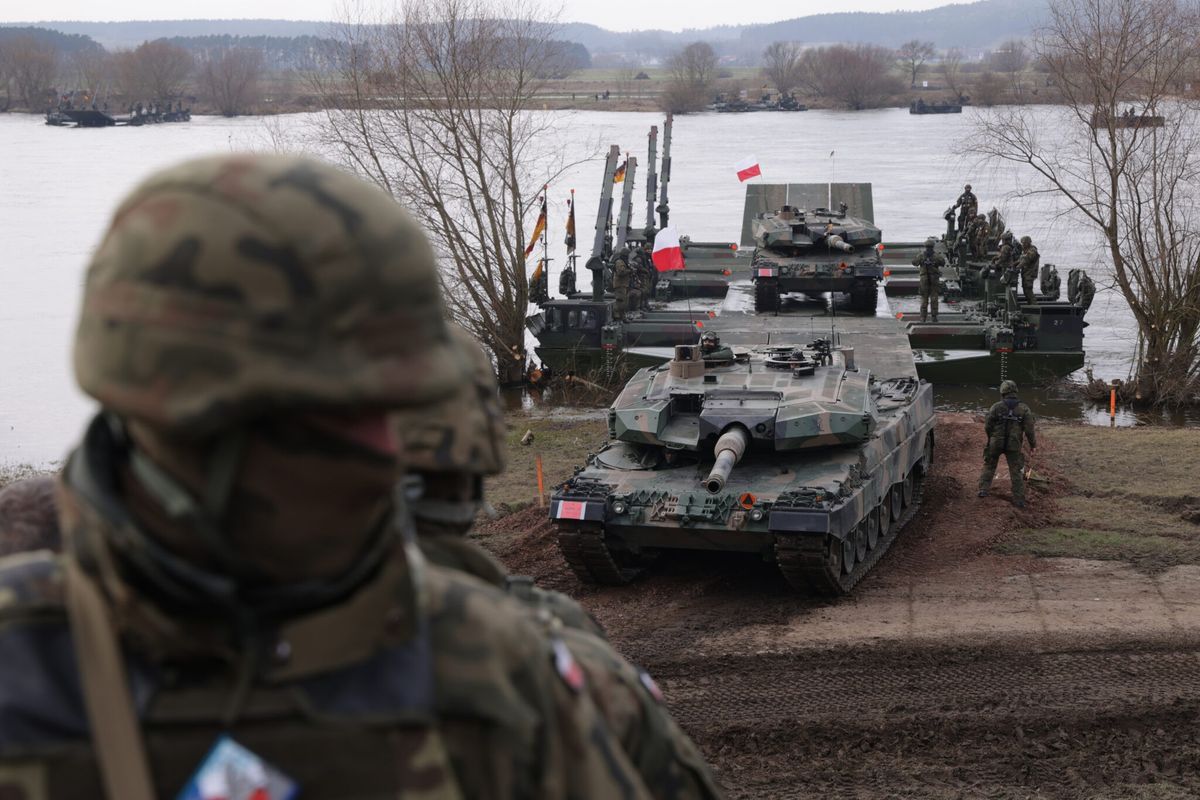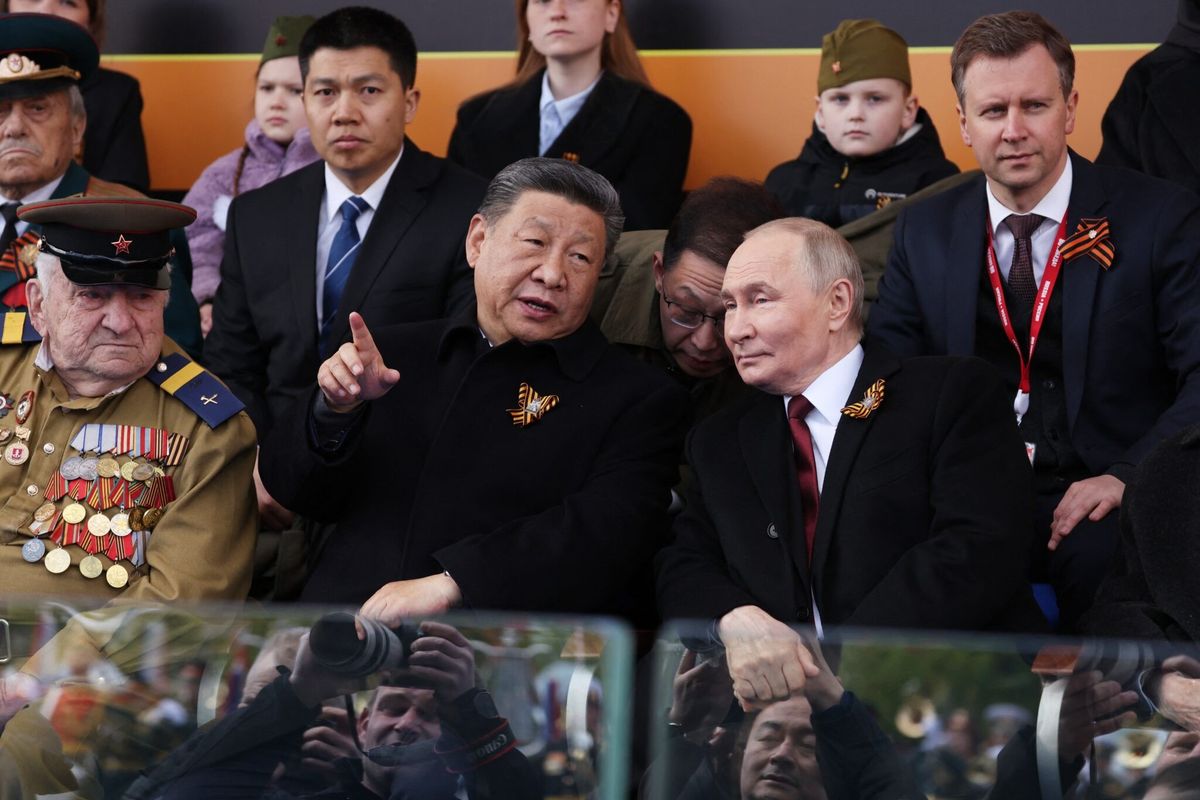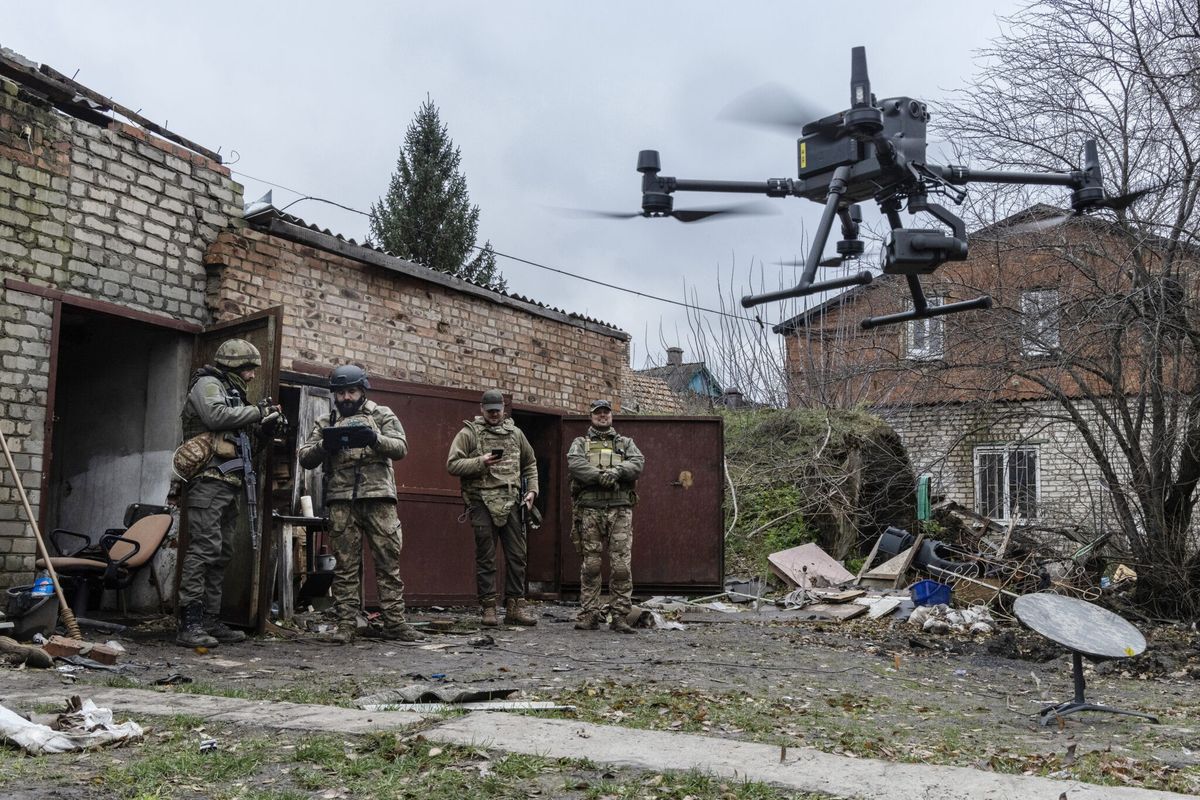SUBSCRIBER+ EXCLUSIVE INTERVIEW - It’s one of the lesser known and less-publicized stories of the two-year-long war in Ukraine: Americans who have joined the fight. From volunteers on the frontlines to private sector executives with keyboards, a number of Americans are working directly alongside the Ukrainians in this war.
In the early days after Russia's invasion, the Biden Administration issued clear warnings to Americans against traveling to Ukraine, and made clear that there must be no official U.S. “boots on the ground“ there. That's a function of U.S. fear that Americans who decide to engage in direct combat with the Russian military may spark a wider war. But some volunteers did not heed the warning.
On the frontlines, precise numbers are hard to come by, but in the immediate aftermath of Russia's February 2022 invasion, an estimated 20,000 foreigners from roughly 50 countries volunteered for the fight; a year ago, between 1,000 and 3,000 foreigners were believed to be active in Ukraine, either fighting or training Ukrainian forces. It's a volunteer effort that brings legal questions, military questions, and of course questions about the risks involved.
Some American volunteers have gone to Ukraine with little or no military experience; others are combat-tested veterans of wars in Iraq and Afghanistan. To date, an estimated 30 - 50 Americans have died in combat there.
On the private sector side, dozens of leading global companies based in the U.S. have brought their own technologies to bear on the war, oftentimes lending support and software while not charging Ukraine a dime.
The Cipher Brief talked with experts Lt. Gen. Frank Helmick (Ret.) and Gary Corn, about the sobering situation on the ground in Ukraine and about just what American volunteers are doing both on the front lines and behind the keyboards.
Lt. Gen. Frank Helmick (Ret.), Former Commander, XVIII Airborne Corps
Lt. Gen. Frank Helmick, U.S. Army, retired as Commanding General of America’s only Airborne Corps and the nation’s largest military installation, Fort Bragg. He served as the Deputy Commanding General for Operations with United States Forces–Iraq and commanded the Multi-National Security Transition Command–Iraq and the North Atlantic Treaty Alliance (NATO) Training Mission–Iraq. Today, he is a Senior Vice President at SOSi.
Gary Corn, Former Staff Judge Advocate to U.S. Cyber Command
Gary Corn served in the U.S. Army as a military attorney and was Staff Judge Advocate (General Counsel) to U.S. Cyber Command as well as Deputy Legal Counsel to the Chairman of the Joint Chiefs of Staff, Staff Judge Advocate to U.S. Army South, Special Assistant United States Attorney in the District of Columbia, and on deployment as the Chief of International Law for Combined Forces Command Afghanistan. He is now Director of the Technology, Law and Security Program at American University.
THE CONVERSATION
This Cipher Brief excerpt of a full briefing exclusively for Subscriber+Members has been edited for length and clarity.
The Cipher Brief: Let's dig into this 'brothers in arms' between American volunteers and Ukrainians who are fighting side-by-side on the front lines. Are there legal issues that govern the ability of American volunteers to fight there and what are they facing once they do?
Corn: There is no legal obligation for the United States to keep Americans from volunteering to go and fight in Ukraine. International law does not require the United States to prohibit its citizens from going and participating in that war. And there is not necessarily a law on the books - as a domestic law matter - that would criminalize that activity.
For those people who go there, obviously they know the risk they're taking. And if they are incorporated into the Ukrainian armed forces, in theory - they are protected in the event they were to be captured as prisoners of war because they're members of the Ukrainian armed forces. If they're not integrated into the armed forces, then they are civilians in that battle space and depending on what activities they're engaged in, they may as a matter of law be legitimately targeted as civilians who are directly participating. Those are the risk profiles.
Then again, this all depends on Russia caring at all about these rules in the way that it engages with and treats anybody in the battle space. And we've seen a pretty stark record of legal compliance by the Russians.
The Cipher Brief: What do these volunteers do once they get there? Who's organizing them and who's doing the training?
Lt. Gen. Helmick: There's no synchronized method to train the Ukrainian forces with these volunteers who go over there. They're well-meaning volunteers and are typically very skilled at what they're doing, but it's a patchwork of success basically on the front lines.
Look, we don't need to build a Mercedes here. We need to be able to train adequate fighting skills, and to train in the air, on the ground and at sea, if you will, to defeat the Russians and regain the territory thye have taken.
I had a chance to sit down and talk with a U.S. veteran who just came back from the front lines in Ukraine and he said that for three weeks they were fighting in an area and gained 10 yards of ground. It is World War I trench warfare that these soldiers are facing, and they're being killed every day and they're being outnumbered. Russia's in this for the long term. They can wait us out. The donor fatigue and the support fatigue in the western countries, you can see it and read about it every day and you can almost feel it basically in Ukraine, too.
The Cipher Brief: There are two different battlefields in Ukraine right now. There's the physical battle space and the trench warfare similar to World War I. And then there's the technology battlefield, where we've seen a lot of private sector companies come in and lend their software or their capabilities for free. How has that battle space has evolved over the last two years of this war?
Corn: Drones have changed the face of the battle space. And then you add in the external actors - the notorious one - of course - has been Elon Musk with Starlink. People will debate how effective (Russia) was in conducting its initial cyber operation, but it certainly took down some of the communications infrastructure for a time. And then you see a company like Starlink come in and say, 'well, we're going to try. We're going to help fill that gap and start providing downlink terminals and other things for the Ukrainians to be able to communicate in combat.'
At the same time, we've seen, at least in the case of Elon Musk, that he's putting his finger on the scale in different directions at times, which has been a problem.
But you can look across the board - Microsoft, Amazon Web Services, Google, Cisco - they're all engaging to bolster and help the cybersecurity landscape for the Ukrainians, which is critical across the board, not just for the war-fighting aspects of it, but for societal protection, and there are plenty of other instances of companies that are providing technological advantage in the battle space.
The Cipher Brief: Aside from the aid package that is being held up by Washington politics, are there other things that you think would change the nature of the situation on the battlefield right now?
Lt. Gen. Helmick: My big concern is that the policy needs to change. There is a restriction right now on allowing contractors or subject-matter experts, if funded by the United States, to be allowed in the country. I think that policy needs to be reconsidered, and it needs to be softened a little bit. It's not an escalation of force to have a senior partner listen and provide advice to some commanders on the ground. That's the one thing that I personally would like to see happen in the near term.
Corn: Obviously the aid package being held up right now is hugely consequential, not just for getting equipment and supplies flowing and on the ground, but there's the morale aspect of it. This is not a good moment in the fight right now, and we need to be bolstering and supporting in every way that we can over time.
There are some legal aspects surrounding what you can do and how far you can get involved, and when you are violating the laws of neutrality. But ultimately, I think it’s that practical risk question that we need to be taking a much harder look at because this is an extremely consequential fight.
The Cipher Brief: There’s the difference between volunteers who decide to go and fight there on their own, and groups of people who are trained contractors. The U.S. government uses contractors all over the world, but they're U.S.-funded, so would that require a policy change? And would it bring a different level of professionalism, and organization to this fight?
Lt. Gen. Helmick: Absolutely. Let's just take the F-16 for example. It's a weapon system that is going to be fielded by the Ukrainians. They're already being trained on it and the pilots are being trained on it. Once those airplanes do get to Ukraine, they're going to have to be serviced on the ground, armed on the ground, maintained on the ground in Ukraine. Ukrainians are smart, they can pick it up very, very quickly.
Other nations could provide that sort of support, but who is organizing this effort? Who is leading this effort where contractors could come in if their company allows and if funding is approved?
The F-16s alone aren't going to change the calculus of the battle. It's the support, the continuous reliable support for the Ukrainians. That’s what's going to change the calculus of this effort.
The Cipher Brief: The U.S. has trained advisors on the ground in a lot of places around the world. So does this boil down to a straight policy decision?
Corn: I would say for the most part, yes. We've done it in other circumstances, but a lot of times those are train, advise and assist missions where we're using our own military personnel to support partner forces, and sometimes we have contractors in that mix. This is a little different because we are trying both as a matter of overall appearance and fact - to maintain that we are not part of this conflict. We are supportive of Ukraine, but we are not part of this conflict and certainly I think that's paradoxical in some sense.
The Cipher Brief: What do you think Ukraine needs most right now, given that policy is not allowing for this organizational training, or for putting advisors and trainers on the ground?
Lt. Gen. Helmick: I think we're in the wait-and-see mode with the aid package. I do think that we need to send a critical message to Ukraine that they will have - and our actions have to match this - consistent and reliable western support.
We're fighting a cancer that we can't control right now, and we have an opportunity to at least push it back and we're going to miss this opportunity.
The Cipher Brief: Are you seeing opportunities that aren't being exploited right now on the U.S.?
Corn: It's hard for me to say, not being on the inside, but I know that there are aspects of support that can help offset Russian advantages, like providing intelligence, the advise-and-assist piece that's not necessarily dependent on the funding packages in the same way. But there's a line. There have been reports about U.S. intelligence that was used to do direct strikes against some of the Russian ships and other things, and the U.S. was very careful to say, 'Wait a minute. We're giving general intelligence support. We're not providing that kind of direct targeting information and planning information.' Because I'm quite sure that the lawyers at the NSC and the Department of Defense are whispering in the policymaker's ears that that's the kind of thing that can be seen as making you a belligerent in this war.
And so they're trying to walk that line. As a practical question, the Russians don't care. They're going to target what they're going to target when they feel they need to target it. So whether we are technically, as a matter of law, co-belligerent I think is less of an issue to drive the policy, but it's still part of it.
The Cipher Brief: Let's go back to the experience of those Americans who are volunteering to go and fight. What makes them decide to do something like this?
Lt. Gen. Helmick: The guys we had a chance to speak with while we were there are incredibly dedicated to Ukraine. What meets them when they arrive is nothing. Basically they have to fend for themselves. Their success is built on relationships. Some of the units get support, some of the units don't get support.
They're trying to do all they can to make sure that Ukraine is successful in their little piece of the battle space, whatever that piece is, whether it's a battalion or a platoon. One of the large challenges they have is that there's no synchronization, no top-down institutional training methodology or system currently in place.
These volunteers put their life at risk, paying for this a lot on their own. They may get some donations from the private sector, and going forward we could make a gigantic difference if we provided some of that support. I'm talking about subject-matter experts, contractors, whatever you want to call them on the ground.
They know there's no tomorrow if they don't win today, there is no tomorrow for that country. They are literally fighting for their freedom. And you could sense it when you're talking to these guys.
The Cipher Brief: If you had one message that you feel is crucial for every single member of Congress to understand about this particular conflict, what might that one thing be?
Corn: This is not a political issue. Traditionally this would not have been dealt with as a political issue, but now everything is political and that's bogging everything down. I would say the border questions are important, but stop dragging down one at the expense of the other. We have to recognize that this is a centerpiece of a much bigger fight that we have to confront. We need to be all in.
Lt. Gen. Helmick: I would tell them there's a big difference between managing this effort and winning this effort. It seems to me we are managing the effort, and if we were winning the effort, we'd put all the chips on the table. We've got a cancer, we've got a chance to stop that cancer and it's either pay-me-now or pay-me-later.
Read more expert-driven national security insights, perspective and analysis in The Cipher Brief
















